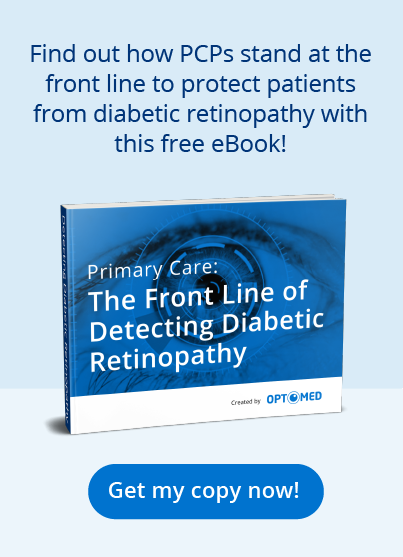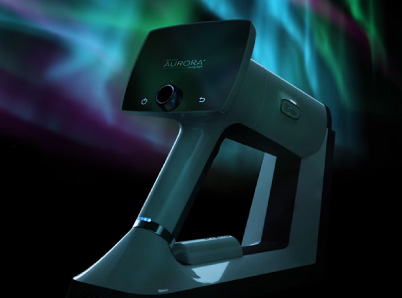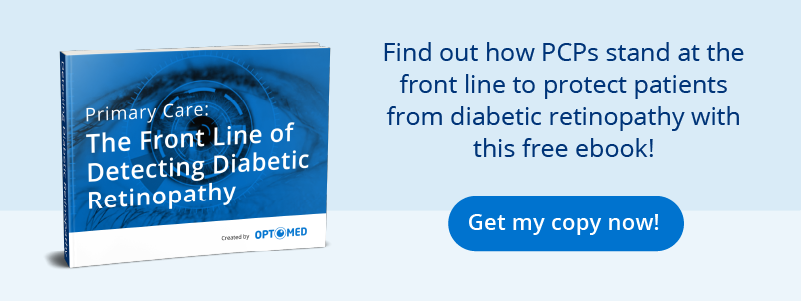Diabetic retinopathy is a treatable condition but remains a leading cause of blindness worldwide, mainly because many patients do not or cannot receive timely screening exams. Optomed Aurora is a scalable retinopathy screening tool that can be used by primary care physicians (PCPs) in conjunction with telemedicine and artificial intelligence to ensure timely detection and treatment.
Epidemiological studies reveal that in the United States alone, about 700,000 people live with diabetic retinopathy and another 65,000 are newly diagnosed every year. About 550,000 people experience significant loss of sight from a related condition, macular edema, with about 75,000 newly diagnosed cases of macular edema annually. These two conditions result in 8,000 cases of blindness every year. The tragedy of blindness caused by vascular complications of diabetes is that detecting diabetic retinopathy in time makes it mostly preventable.
PCPs already guide their patients to manage the risk factors for diabetic retinopathy, HbA1C, cholesterol, blood pressure, and smoking. Optomed fundus cameras empower another service of PCPs for their diabetic patients, which is detecting diabetic retinopathy in a timely manner. Optomed makes detecting diabetic retinopathy a scalable, affordable service that PCPs can offer their patients with diabetes.
How does Optomed keep PCPs in the loop for detecting diabetic retinopathy?
A simple reality of retinopathy care is that diagnosis tools don’t work if patients don’t make their appointments with their doctor. Optomed provides PCPs a salient incentive for patient compliance: the Optomed Aurora enables handheld fundus imaging without any need to dilate the patient’s eyes first.
Patients find this feature quite attractive. It means they can drive themselves home from the exam, lose less time from work, and spend less time in the doctor’s office, a concern exacerbated by COVID-19 precautions.
The Optomed Aurora addresses another salient issue in a patient-centered model of retinopathy care. Patients can realize a financial advantage from getting screenings for diabetic retinopathy from their PCP.
Not every patient has an in-network retina specialist within a reasonable driving distance. Their health insurance plans may also require considerable copays. Retina scans by an ophthalmologist usually are not covered if there is no diagnosis. Fees for screenings by retina specialists can easily be out of reach for Medicare patients. These financial hurdles to detecting diabetic retinopathy do not occur when the screening is done by a PCP with the Optomed Aurora.
The Aurora meets a modern standard of care and offers a four-inch image and a 50-degree field of view. It does both retinal and anterior eye imaging, and images can be added to electronic medical records over wireless or USB connection. The Optomed Aurora has other features critical for the successful adoption of the technology:
- The Aurora is scalable.
- The Optomed Aurora is a handheld, mobile-screening device. Its use is not limited to one office location. Physicians can offer diabetic retinopathy screening at all of their offices.
- The Aurora is designed to be used by non-specialists. PCPs and their staff can learn how to use it in just a few, brief training sessions.
- The Aurora can be connected to Optomed Avenue Viewer to access artificial intelligence for screening and analyzing various eye diseases, such as diabetic retinopathy.
- The Optomed Aurora can be used to transmit images to retina specialists through Optomed Avenue SYNC for remote telemedicine consultations from your office. A meta-analysis of data from multiple studies finds that telemedicine referrals of retinal images for detecting diabetic retinopathy are cost-effective, and the results of diabetic retinopathy treatment are comparable to those from traditional systems.
The Optomed Aurora is great technology at an affordable price point. It answers a largely unmet need by involving PCPs in detecting diabetic retinopathy. But why is it so important for them to get involved?
Some of the most significant barriers to following up with PCP recommendations for diabetic retinopathy screening are emotion-based. Many people with diabetes feel surveilled and criticized by family members and the community for their issues in diabetes management. The negative feelings that result interfere with the self-efficacy and self-esteem needed for adhering to guidelines for annual retinopathy screening. Others avoid the ophthalmologist because they have limited tolerance for more bad news. These patients need help with their habits, but they do not find that help from retina specialists. So, they rely on PCPs.
At least one study has found that 81% of diabetic patients will follow up with retinopathy screening and treatment when their PCP gives them a strong rationale for treatment.
PCPs are ideally suited to providing retinopathy education. They are more easily accessible to patients, and they build relationships of trust. Therefore, some patients are far more likely to have a retinopathy screening done in their PCP’s office with Optomed.
Here at Optomed, our mission is to help save the vision of millions of people. By integrating our software and artificial intelligence solutions with our camera, we enable eye screening for everyone, wherever they are. To see how we can equip you to save the sight of more patients, schedule a free consultation today!



